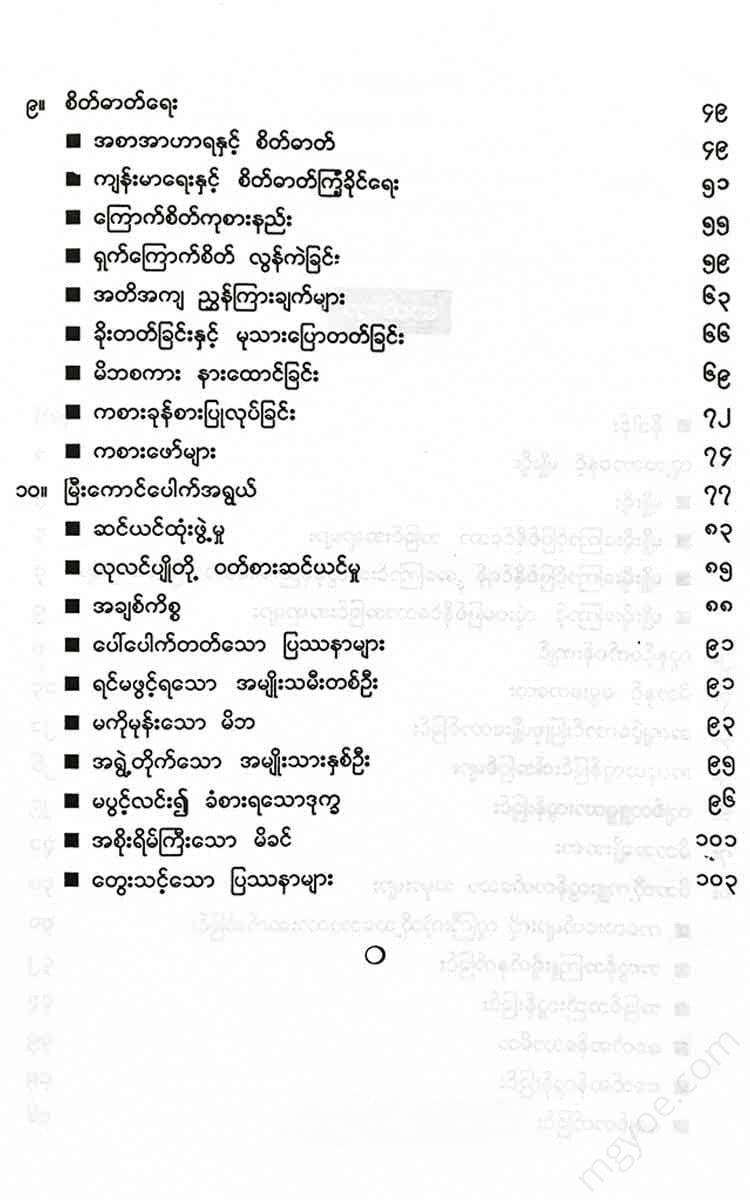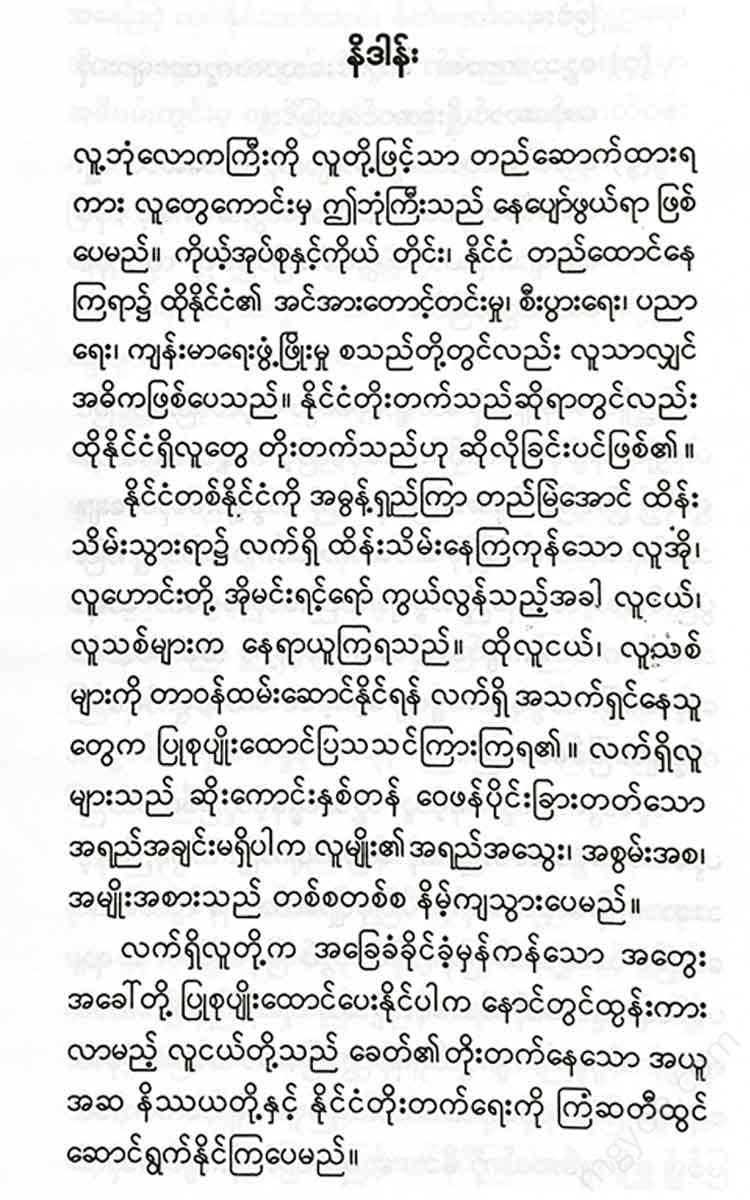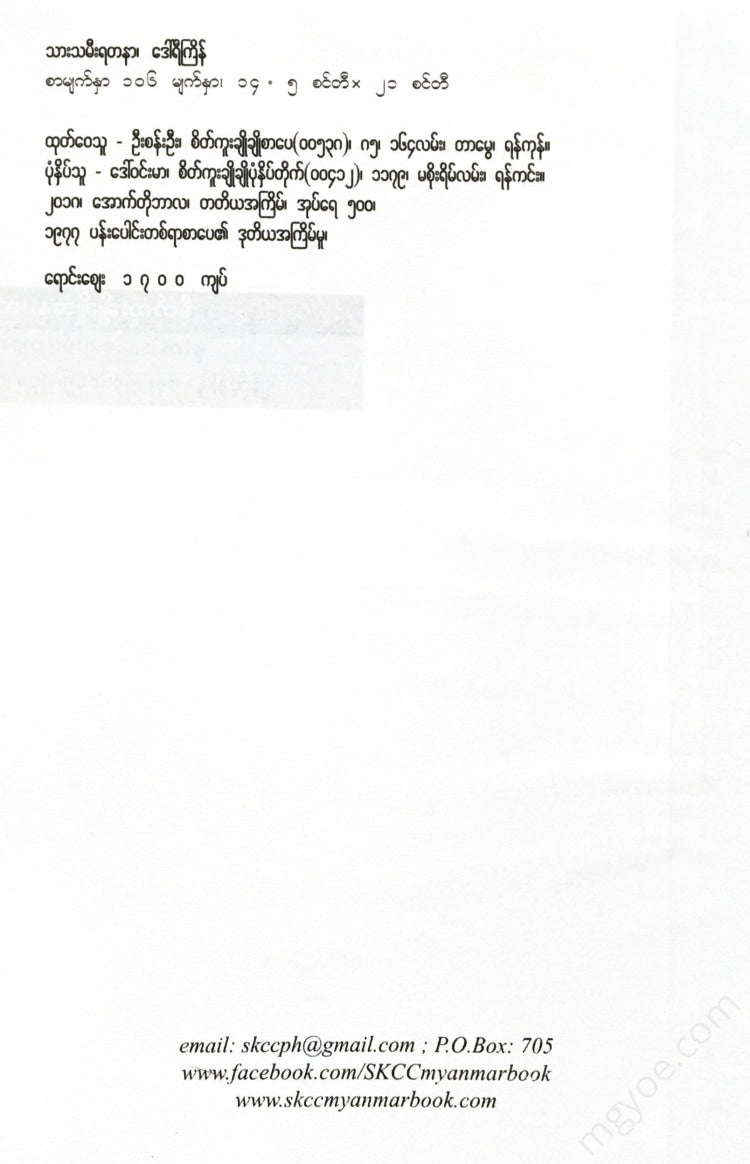စိတ်ကူးချိုချိုစာပေ
Daw Yi Kyin - Children's Treasure
Daw Yi Kyin - Children's Treasure
Couldn't load pickup availability
(1) Human nature and heredity
Let us ask what is a human being. Let us explain it in general terms. It is a living being that has a set of organs and parts that can perform various functions for living, eating, and living. It can also be said that this being is different from other living beings and is very intelligent. | Let us ask further, how did a human being come into being? This is the answer.
If you ask an ancient farmer or a modern botanist how a tree grows, they will usually answer that it grows by planting a seed in the ground. If the soil and the seed are good, the tree will produce a good crop. If the soil is good but the seed is bad, it will not grow. If the soil is good but the seed is not good, it will die.
Similarly, a person grows up in two environments, the seed, the lineage, and the soil. If one has good lineage but the environment is bad, one cannot become a good person. If one has good environment but the lineage is not good, one cannot become a good person. A person's condition is the product of lineage, environment, and time.
Let me explain. Anyone who has studied arithmetic will know addition, subtraction, multiplication, and division. The concept of addition is that the original number is zero, but if you add that number to 2, it becomes 2. If you add it to 5, it becomes 5. (1+5=5) The concept of multiplication is not like that. If you multiply zero by 2, the answer is zero. No matter how big the number is, the answer will be zero. If you write it as a number, it will be (ox 9 x 20) like this.
A person's mental and physical condition are the product of heredity and environment, but if heredity is zero, then whatever the environment is multiplied by will still be zero. Even if heredity is an invaluable factor, if the environment is zero, it will still be worthless. There is still time. No matter what kind of environment you are raised in, the benefits and harms will only be apparent for a short time. The longer the time, the more deeply rooted it will be. Therefore, it is said that a person's current condition is the product of heredity, environment, and time.
Lineage
The lineage should be called the director of a person's life story. The lineage cannot take the place of the protagonist, who can enter, act, and leave the room that belongs to him. He is the director who teaches the character how to act from the beginning of life to the end of life. No matter how good the protagonist is, if the director's motivation is poor, the whole film will be ruined.
Until the baby is born, it is not allowed to learn by imitation. Once it is born, the question arises whether it can learn everything about its environment. It cannot learn everything. The body parts, nerves, brain, etc. respond to stimuli according to their age and size. Because of the ability to learn and observe the growth and development, it can gradually learn and imitate. The characteristics that come with genetics do not appear immediately at birth, but gradually appear as the body and intelligence develop and become able to move, work, and speak.
What are the things that are inherited? The question of how the physical and material aspects are inherited is a matter for scientists who study and research living beings, and is not discussed in this book. However, according to the basic principle stated by scientists, whatever a person learns and learns during his lifetime cannot be passed on to his children. It is also noted that changes in other organs that are not related to the reproductive organs cannot be passed on to his children. A pregnant woman wants her child to be a great scholar when he is born and grows up, so she has been seen attending literary lectures, listening to all kinds of musical instruments, dancing, plays, and concerts during her pregnancy. Another person, who had a fingernail on his hand, cut it off with the intention of preventing his children from inheriting it, but his son also had a fingernail. These ideas are incorrect.
There is still a lot of research needed on this subject, and scholars in Europe are still doing research.
When describing lineage, it is important to not assume that if the parents are the same, the children will have the same abilities. There are siblings who have the same parents but are different in appearance, temperament, abilities, and intelligence. Similarly, you may have come across people who look like their father, people who look like their mother, people who look like their father and mother, and people who are completely different from their father and mother.
Why is this so? Let's say U Phyu marries Daw Nyo and has four children. In fact, U Phyu and Daw Nyo's children will have half of U Phyu's blood and half of Daw Nyo's blood. However, Daw Nyo's blood includes Daw Nyo's blood, just as U Phyu's blood includes U Phyu's blood. Therefore, some of the children born to U Phyu and Daw Nyo may have a grandmother, grandfather, or a few characteristics of each that are different from U Phyu or Daw Nyo, so the children will be different from each other, from their parents, and so on.
Therefore, Mirobra must be beautiful and beautiful as a child. Mirobra must not be inferior to wisdom and superior to a child.
This type of case can be both physical and mental. However, it is not possible to trace the lineage everywhere. In which case, the lineage will be described in the following.
The scientific study of psychology (Amram Scheinfeld) is described below.
Possible hereditary factors
Intelligence, slowness of reaction, skill in handling tasks, and multisensory discrimination.
Intelligence refers to a child's intelligence and intelligence. Reaction refers to the ability to make quick decisions in a flash, called reflexive intelligence, when solving a problem.
Skill in action refers to the ability to work neatly, skillfully, skillfully, and skillfully in matters of intellectual production, whether done with the hands or the mind. In such cases, there is reason to attribute lack of skill to heredity.
There are very few cases where genetics can be the cause,
Excitement.
Mood, changeability, or stability, quickness, slowness, etc.















